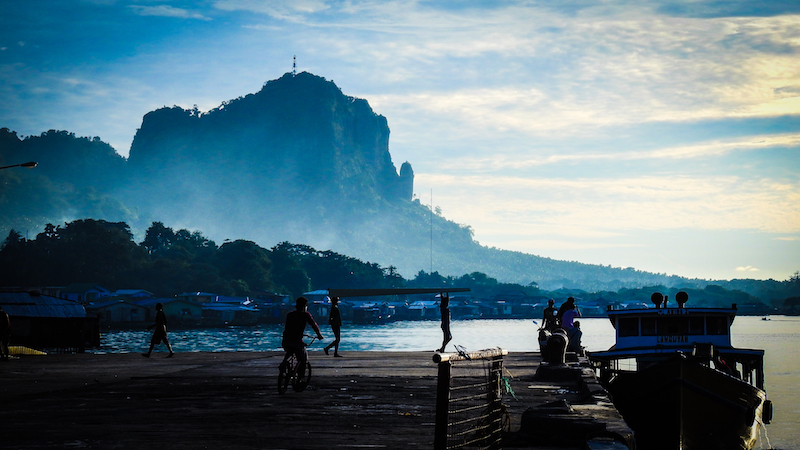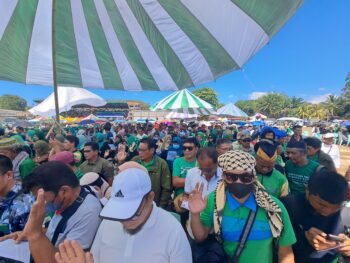 Economic activities in the port on a late afternoon in Bongao, Tawi-tawi with Bud Bongao peak as backdrop. MindaNews photo by FERDINANDH B. CABRERA
Economic activities in the port on a late afternoon in Bongao, Tawi-tawi with Bud Bongao peak as backdrop. MindaNews photo by FERDINANDH B. CABRERA
DAVAO CITY (MindaNews/03 July) – The Philippine government will resume next month the centuries-old barter trade at the border areas of Mindanao, Malaysia and Indonesia, an official of the Mindanao Development Authority (MinDA) said.
The reopening came more than three years after Malaysia closed its border with southern Philippines sometime in April 2016 after the Abu Sayyaf kidnapped four Malaysians off Sabah coast.
Olie B. Dagala, director III at Investment Promotion and International Relations Office of MinDA, said during “Wednesdays’ at Habi at Kape” in Davao City that they are waiting for the 10-member Mindanao Barter Council (MBC) to complete the guidelines formalizing the cross-border trading, considered a “shadow economy” for lack of government regulation.
The MBC is tasked to “supervise, coordinate, and harmonize policies, programs on barter in Southern Philippines.”
President Rodrigo R. Duterte signed Executive Order 64 in October 2018 creating the MBC.
The council consists of the Secretary of the Department of Trade and Industry (DTI) as chairperson, MinDA chairperson and Bureau of Customs commissioner as vice chairpersons, and representatives from the Department of Finance, Department of Foreign Affairs, Department of Agriculture, DTI-Autonomous Region in Muslim Mindanao, Maritime Industry Authority, Philippine Coast Guard and Philippine Ports Authority as members.
“We want this economy to be formalized in order for them to dock at the formal ports and they will be taxed accordingly. It’s about making the ‘informal trade’ formal,” Dagala said.
He added this new approach enforced with regulations by the government will promote more “formal engagements” among the barter traders at the border areas.
MinDA assistant secretary Romeo Montenegro said the council has yet to issue comprehensive guidelines governing barter system, including, but not limited to, a mechanism for the valuation of barter goods, a list of allowable barter goods, and measures to prevent smuggling and circumvention of customs laws.
Aside from creating the guidelines, the council is also tasked to review existing policies, rules and regulations of government agencies that affect all aspects of barter trade, and submit recommendations to the President and Congress.
Montenegro said the non-conventional shipping vessels – jungkong, kumpit, and lantsa – would be allowed to cross the maritime borders under the barter system because the traders have used them as the traditional modes of conveyance.
The barter trade offices established in Siasi and Jolo in Sulu and Bongao in Tawi-Tawi, where barter ports are also located, will coordinate and monitor the activities related to barter trading, he said.
Goods traded under the barter system will enter the Philippine territory only through the barter ports.
Under the ASEAN Free Trade Agreement and the ASEAN Trade in Goods Agreement, import duties on several products traded within the region shall be eliminated but applicable laws, rules and regulations will remain for goods that have tariff protections and/or quantitative restrictions such as rice, corn and sugar and that traders must secure special import permits.
Creation of barter ports in other areas the President’s approval but ports owned and operated by private individuals or entities will be excluded.
For systematic and streamlined processing of entry and exit of allowable goods, offices of BOC and Bureau of Internal Revenue shall be established within the MBC-accredited ports.
Under EO 64, all qualified traders of allowable barter goods shall import or export only after securing the required goods declaration or export declaration, clearances, licenses and any other requirements after the arrival of goods but prior to release from custody shall be governed by relevant laws, rules and regulations.
Montenegro said the players in the barter trade who have remained “informal, untaxed, unregulated, and unmonitored” would have an opportunity to join the formal trading.
“Right now, they are called ‘shadow economy’. We have no way of knowing how much volume of goods are coming in, how much in terms of value are they pumping into the local economy because there had been no system in place as of the moment,” he said.
He added the traders, as registered players in the barter system, would no longer have to hide from the maritime security forces, encouraging more trading activities at the borders to reduce the prices of traded consumer goods.
“As the barter trade expands, we will have more of the goods from Tawi-Tawi, Basilan and Sulu be brought across the other side of the border. So, it will not just be us buying goods from Malaysia or Indonesia but our own products also, be semi-processed and shipped across the border,” he said. (Antonio L. Colina IV/MindaNews)
